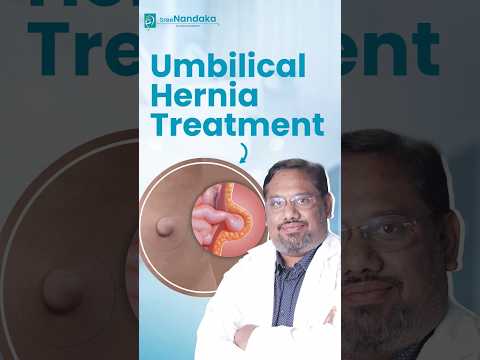- What is a Hernia?
- Signs and Symptoms of Hernia
- Causes and Risk Factors of Hernia
- Diagnosis of Hernia
- Hernias Correction with Laparoscopy
- Suitable Candidates for Laparoscopic Hernia Repair
- Benefits of Laparoscopy for Hernia Correction
- Hernias Correction with 3D Mesh Repair
- Benefits of 3D Mesh Repair
- Frequently Asked Questions
What is a Hernia?

Hernia is a medical condition wherein one of the organs, usually inside the abdomen or in the groyne area, bulges out through an opening or weakness in the muscles or tissues that accommodate it.
Signs and Symptoms of Hernia
Every type of hernia may not be symptomatic, if they are they may vary in their symptoms. One of the signs indicating a hernia is a noticeable lump or bulge that shows up in certain physical positions or during certain activities like coughing, laughing, straining, or lifting and gets back to normal at other times. When the hernia occurs, the patient may feel pressure, a dull ache, or pinching.
Causes and Risk Factors of Hernia
Hernia can develop during one’s lifetime with age and the regular wear and tear of muscles and tissues adds to it. Sometimes, the weakness or pre-existing opening in the muscles or tissues, present at birth, can allow organs or other tissues to push through. ‘The condition can also be an outcome of surgery or a traumatic injury- more often a repetitive stress injury’, shares Dr. Praveen Kumar Koduru, senior laparoscopic and laser surgeon in Kompally, Hyderabad at Sree Nandaka Advanced Surgery.
Some factors can make an individual more likely to develop a hernia during their lifetime. These include:
- Physical labour jobs or any work involving long hours of standing
- A chronic respiratory illness that causes persistent cough or sneezing
- A history of pelvic or abdominal surgery
- Chronic constipation or straining while urinating or defecating
- Pregnancy, especially repeated or multiple pregnancies
- Chronic obesity (when Body Mass Index is greater than 30).
As per hernia surgeon in Hydearbad Dr. Praveen Kumar Koduru, a child is at risk of being born with hernia if:
- There is premature delivery.
- The child has other medical issues like cystic fibrosis, connective tissue disorder, hip dysplasia, undescended testicles, or reproductive/urinary problems.
Diagnosis of Hernia
Often, reviewing a patient’s medical history and current symptoms followed by a brief, simple physical examination is enough to diagnose a hernia by Dr. Praveen Kumar Koduru. Some types of hernia can be seen or felt by the doctor when the patient is asked to do some activities or change positions. The doctor can check on when the bulge appears and disappears and how serious it is. Sometimes, the doctor may ask for a soft tissue imaging test called a Ultrasound CT scan to confirm the diagnosis of hernia.
Hernias Correction with Laparoscopy
Hernias need a surgical repair, but not necessarily just after getting it diagnosed. A small or mild hernia that occasionally shows up is watched out to check if it worsens. Hernias do tend to worsen over time and it's only cure is hernia repair surgery. Laparoscopic hernia repair in Hyderabad performed at Sree Nandaka Advanced Surgery is a less invasive surgery for hernia correction.
At Sree Nandaka Advanced Surgery, our hernia surgeries doctors in Hyderabad are extensively skilled and have decades of experience in performing laparoscopic hernia repair.
Preparation for The Surgery
During the initial consultation with the surgeon, the patient is briefed about the entire surgical procedure and results and provided with pre-treatment instructions.
Before the surgery, the patients must:
- Stop eating or drinking anything at least 8 hours beforehand.
- Take the medications only allowed by the surgeon in the days leading to the surgery. Blood-thinning drugs must be avoided.
The Surgical Procedure
Laparoscopic hernia repair is performed under general anaesthesia, meaning the patient will sleep throughout the procedure.
The surgery starts with the making of three to four small incisions around the hernia. One of the incisions is less than a cm in size while others are made much smaller, just like a keyhole size. Through the larger incision, the surgeon inserts a laparoscope- a thin tube with a camera and light at one end, to help the surgeon visualise the hernia. Next, the surgeon inserts surgical tools through other incisions to help get rid of the bulge. At this step, the abdomen may be inflated with a harmless carbon dioxide gas or an inflatable balloon to create enough space for the surgeon to easily work. The Best Hernia Repair Surgeon in Hyderabad carefully pulls the hernia contents back to their natural position. Finally, a mesh piece is installed on the inner side of the gap to reinforce the weakened site of the abdominal wall.
Result, Recovery, and Aftercare
Following the laparoscopic hernia repair, most patients get a hospital discharge the same day. The length of hospital stay depends upon the patient’s overall health. Typically, the patients resume work within a week of surgery and daily activities within one to two weeks. They must go for all follow-up visits and follow the post-surgical instructions as recommended by the surgeon.
These include proper wound care and no physical activities that strain the surgical site. Walking is encouraged but strenuous activities including swimming must be avoided by patients for some weeks. The intake of a normal diet must be resumed when permitted. The patients must have healthy lifestyle habits and maintain their body weight.
Suitable Candidates for Laparoscopic Hernia Repair
Laparoscopic hernia repair is usually recommended for anyone suffering from hernias like umbilical hernia, abdominal hernia, incisional hernia, parastomal hernia, spigelian hernia, or flank hernia.
The non-suitable candidates are:
- Those having an incarcerated hernia.
- People who cannot tolerate general sedation.
- Unhealthy individuals who are suffering from bleeding disorders such as haemophilia or immune thrombocytopenic purpura or severe lung disease such as emphysema as carbon dioxide used in the treatment may affect breathing.
Benefits of Laparoscopy for Hernia Correction
- It is a minimally invasive procedure.
- The procedure involves making 2-3 small cuts of keyhole size to correct multiple hernias at a time.
- It lowers the patient’s risk of infection.
- The patients can return to work and daily activities soon after the operation.
- The operation time is less.
- The patients experience less pain or discomfort and enjoy shorter recovery time.
- The chances of recurrence of hernia are extremely low.
Hernias Correction with 3D Mesh Repair
3D mesh repair is a game-changer, tension-free therapy to correct hernias, especially the ones of larger size. It involves using a mesh made of propylene to cover the hernia defect in 3D form, meaning from three sides- above, below, and middle.
Benefits of 3D Mesh Repair
- Needs minimal incisions and few stitches
- No sutures are used for fixing the mesh
- Can be performed under local anaesthesia
- Reduces the rate of recurrence of hernia
- Cures hernia at its best
- Quick recovery
- Early hospital discharge
- Additional benefits of laparoscopic procedure.
AT SREE NANDAKA, MAJORITY OF PROCEDURE ARE DONE USING ONLY 3D MESH.
Frequently Asked Questions
1. What if hernias are left untreated?
Mild or small hernias are not serious conditions but they can over time develop into bigger or serious hernias. Gradually, the opening of the tissues or muscles may get weaker and stretch more to allow more tissues and major parts of internal organs to push through and become unrestrained. As a result, the patient may feel intense pain and experience other complications.
2. What are the potential side effects, risks, or complications of having hernia correction with laparoscopy?
The general surgical complications include anaesthesia-related risks, recurrence of hernia, excessive bleeding, or wound infections. For a brief period, some people have difficulty urinating.
3. How should I self-care while living with a hernia?
If diagnosed with a mild hernia or if you have not had a hernia repaired yet, you need to avoid worsening of the hernia. Your doctor may advise you to stop doing laborious work and adjust your lifestyle habits to avoid putting pressure on the affected area. Sometimes, you might be recommended to wear a restraining belt in the hernia-affected part to avoid straining the hernia during physical activities. You must keep a close eye on your symptoms and report seeing anything unusual to the doctor. Rest, it’s always recommended to not delay your surgical repair to prevent the worsening of the condition.
Sree Nandaka Advanced Surgical Centre is a certified centre of excellence in hernia correction in Hyderabad and at the hospital the treatment is performed by highly qualified and experienced surgeons.
For more details on hernia surgery cost in Hyderabad consult the experts at Sree Nandaka Advanced Surgery for more details.

Fixing an Umbilical Hernia | Laparoscopic Hernia Repair in Hyderabad | Dr. Praveen Koduru

Overcoming Severe Hernia | Inspiring Success Story of Hernia Surgery | Hernia Treatment in Hyderabad

Is Inguinal Hernia curable without Surgery? Hernia treatment in Hyderabad (In Telugu )
Leave us a message and our team will get in touch with you.
Address:
Plot no 770, Jayabheri Park,
Behind BigBazar, Kompally,
Hyderabad, Telangana 500014, India.
Email ID
sreenandaka@gmail.com
Contact No.
+91-9000835000,
+91-9000861000
